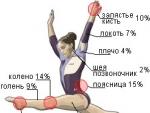The Olympic Games. Олимпийские игры. Олимпийские игры Мое отношение у олимпийских играх на английском
Уровень С. Классическое эссе
The Importance of the Olympic Games
People have been thinking about their health since the time immemorial. The main way to keep fit is going in for sports. That is why the Olympic Games, which have long history, were organized. And this year, Russia is honored to host the winter Olympic Games. So how will they affect us and our country?In my opinion, these Games will play a very important role in the history of the Russian Federation. First of all, we can show our hospitality, our traditions and our culture to people all over the world. I know that foreigners have some stereotypes about Russia, so these Games can break them. Secondly, it will be a great opportunity for our people to communicate and make more friends among guests from different countries. That will make our international relationships stronger.
But some people claim that holding Olympic Games is not a very good idea, because the country has to invest really a great deal of money to organize the ceremonies, build stadiums, hotels and Olympic Games objects and equipment for stadiums and athletic halls.
I strongly disagree with this opinion. I believe the more you give, the better results you will have. So this money will worth it.
In conclusion, I would like to say that Russia is famous for its hospitality and “a wide soul”. I believe that this event will help us become one big family, enjoy all this time and support our country in these important competitions.
Люди начали задумываться о своем здоровье с незапамятных лет. Основной путь поддержания себя в форме – это занятия спортом. Поэтому были организованы Олимпийские Игры, которые имеют свою длинную историю. В этом году, Россия удостоена чести принимать Зимние Олимпийские Игры у себя в гостях. Так как это повлияет на нас и нашу страну?
По моему мнению, эти игры сыграют огромную роль в истории Российской Федерации. В первую очередь, мы сможем показать нашу гостеприимность, наши традиции и нашу культуру людям со всего мира. Я знаю, что иностранцы имеют некоторые стереотипы о нашей стране, так что это событие поможет их разрушить. Во-вторых, это будет замечательной возможностью для нашего народа пообщаться с людьми из разных стран и завести себе друзей среди иностранцев. Это поможет нашим международным отношениям стать сильнее.
Но некоторые считают, что проведение Олимпийских игр не очень хорошая идея, так как государству следует вкладывать огромное количество денег в организацию. В строительство стадионов, гостиниц и различных Олимпийских объектов и оборудование для стадионов и манежей.
В заключение я бы хотела сказать, что Россия известна своей гостеприимность и «широкой душой». Я верю, что это событие поможет нам стать одним целым, насладиться этим временем и поддержать нашу сборную в этом сложном соревновании.
M any people all over the world are interested in sport. Sport helps people to stay healthy and makes them more organized and better disciplined in their daily activities.
They have always paid great attention to sport in our schools, colleges and universities. You can hardly find a school without a gym or a sportsground. Every city and town has a few stadiums or swimming pools, where local or even international competitions are usually held. Traditionally, sport could be divided into professional and amateur sport.
Former Soviet Union and later Ukrainian and Russian sportsmen have set a great number of world records in gymnastics, weightlifting, tennis, swimming, running, high jumping, etc. Our sportsmen also participate in the Olympic Games and always win gold, silver and bronze medals.
The Olympic Games have long history. They started in 776 ВС in Greece and took place every four years for nearly twelve centuries at Olympia. They included many different kinds of sports. All the cities in Greece sent their best athletes to Olympia to compete in the Games. When the Games took place, all the wars stopped. So, the Olympic Games became the symbol of peace and friendship.
Now, there are Summer and Winter Olympic Games. They are held separately. There are always several cities wishing to host the Games. The International Committee of Olympic Games selects the most suitable. After that, the host city starts its preparations for the competitions, constructs new sport facilities, or reconstructs them, reconstructs stadiums, hotels, press centres, etc. Thousand of athletes, journalists and guests arrive to the Games, and it takes great efforts to arrange everything.
Russia joined the Olympic movement in 1952. In 1980, Moscow hosted the twenty-second Olympic Games. The latest . Olympic Games were held in Sydney, Australia. Our sportsmen won medals in many sports. Next Olympic Games take place in Greece, the Motherland of these games.
Перевод
Спорт и Олимпийские игры
M ногие люди во всем мире интересуются спортом. Спорт помогает людям оставаться здоровыми и делает их более организованными, лучше дисциплинированными в их повседневной работе.
В наших школах, колледжах и университетах спорту всегда уделяли большое внимание. Вы едва найдете школу, где нет физкультуры или спортивных площадок. Каждый город и городок имеет несколько стадионов или плавательных бассейнов, где обычно проводятся местные или даже международные соревнования. Традиционно спорт делится на профессиональный и любительский.
Спортсмены Советского Союза, а позднее украинские и российские спортсмены установили много мировых рекордов в гимнастике, тяжелой атлетике, теннисе, плавании, беге, прыжках в высоту и т. д. Наши спортсмены участвуют в Олимпийских играх и всегда выигрывают золотые, серебряные и бронзовые медали.
У Олимпийских игр длинная история. Они начались в 776 году до н.э. в Греции и проводились в Олимпии:каждые четыре года в течение почти двенадцати столетий. Они включали в себя много различных спортивных состязаний. Все города Греции посылали своих лучших атлетов в Олимпию, чтобы соревноваться на Олимпийских играх. Во время Олимпийских игр все войны прекращались. Таким образом, Олимпийские игры стали символом мира и дружбы.
Теперь Олимпийские игры делятся на Летние и Зимние Олимпийские игры. Они проводятся отдельно. Всегда есть несколько городов, желающих стать хозяевами проведения Олимпийских игр. Международный Олимпийский комитет выбирает самый подходящий город. После этого город, в котором будут проводиться Игры, начинает свои приготовления к соревнованиям - строят новые спортивные сооружения, восстанавливают стадионы, гостиницы, пресс-центры и т. д. Тысячи атлетов, журналистов и гостей приезжают на Игры и нужно много потрудиться, чтобы всех устроить.
Россия присоединилась к Олимпийскому движению в 1952 году. В 1980 Москва принимала гостей на двадцать вторых Олимпийских играх. Последние Олимпийские игры прошли в Сиднее, Австралия. Наши спортсмены выиграли медали во многих спортивных состязаниях. Следующие Олимпийские игры пройдут в Греции, на родине этих игр.
The Olympic Games is the greatest international sport event in the world, in which thousands of athletes compete in different types of sports. The Olympic idea means friendship, fraternity and cooperation among the people of the world.
The original Olympic Games began in ancient Greece in 776 B.C. These games were part of a festival held every fourth year in honour of God Zeus in the town called Olympia. It was a great athletic festival, including competitions in wrestling, foot racing and chariot racing, rowing and others.
The Olympic Games were very important for ancient world. In the period of Games all wars were stopped. The Games were accompanied by atrs festivals. Poets recited their poems, singers sang hymns - all this in honour of God Zeus and the sacred Games.
All athletes competed naked. The modern word “gymnastics” originates from the Greek word “gymos” that means “naked”.
Only men could take part in the Olympic Games. Greek women were forbidden not only to participate but also to watch the Games. But there existed Games for women named Gerai (called after goddess Gera).
The Olympic Games took place from the 8th century BC till the 4th century AD. In 394 AD the Roman Emperor Theodosius banned the Olympic Games because he decided that these competitions are, in essence, pagan festival.

In the late 19th century, Baron Pierre de Coubertin decided to revive the Olympic Games. For this purpose, he founded the International Olympic Committee (IOC) in 1894, and two years later, in 1896 the modern summer Olympic Games were established in Athens.
The Games are currently held every two years, with Summer and Winter Olympic Games alternating. The evolution of the Olympic Movement during the 20th century forced the IOC to adapt the Games to the world’s changing social circumstances. Some of these adjustments included the creation of the Winter Games for ice and snow sports, the Paralympic Games for athletes with physical disabilities, and the Youth Olympic Games for teenage athletes.
The Olympic motto is “Citius, Altius, Fortius”, which is Latin for “Swifter, Higher, Stronger”. The motto was proposed by Pierre de Coubertin and was introduced in 1924 at the Olympic Games in Paris.
A more informal but well known motto, also introduced by De Coubertin, is “The most important thing is not to win but to take part!”

The symbol of the Olympic Games is composed of five interlocking rings, colored blue, yellow, black, green, and red on a white field. This was originally designed in 1912 by Baron Pierre de Coubertin. These five rings represent the five continents of the world: America, Europe, Asia, Africa and Australia.
The nearest Winter Olympic Games are to be held in Vancouver, Canada, in February 2010. Next Olympic Games will be held in London 2012 and Sochi 2014.
Олимпийские игры

Олимпийские игры - это величайшее международное спортивное событие в мире, в котором спортсмены соревнуются в различных видах спорта. Идея Олимпийских игр - это дружба, братство и сотрудничество между людьми во всем мире.
Первые Олимпийские игры состоялись в Греции в 776 г. до н.э. Эти игры были частью фестиваля, который проводился каждые четыре года в честь бога Зевса в греческом городе Олимпия. Это был большой спортивный праздник, который включал соревнования по следующим видам: борьба, бег, гонки на колесницах, метание диска и копья и т.д.
Олимпийские игры играли очень важную роль в древнем мире. Во время проведения Игр прекращались все войны. Игры сопровождались фестивалем искусств. Поэты читали стихи, певцы пели гимны - и все в честь бога Зевса и священных Игр.

Все атлеты соревновались обнаженными. Современное слово «гимнастика» происходит от греческого слова «гимос», что значит «обнаженный».
В Олимпийских играх могли участвовать только мужчины. Греческим женщинам было запрещено не только участвовать, но даже смотреть Игры. Но существовали Игры для женщин под названием Гераи (названные так в честь богини Геры).
Олимпийские игры проходили от 8 века до н.э. до 4 века н.э. В 394 г. н.э. римский император Феодосий запретил Олимпийские игры, потому что решил, что, по сути, это - языческое празднество.
В конце 19 века барон Пьер де Кубертен решил возродить Олимпийские игры. Для этой цели он основал Международный Олимпийский Комитет (МОК) в 1894 году, и через два года в 1896 году современные летние Олимпийские игры прошли в Афинах.
В настоящее время Игры проходят каждые два года, причем Летние и Зимние Олимпийские игры чередуются. В 20 веке МОК изменил Игры в соответствии с социальной ситуацией в мире. Эти изменения включали учреждение Зимних Игр, Паралимпийских Игр для спортсменов с ограниченными возможностями и Молодежные Олимпийские игры для подростков.
Олимпийский девиз: “Citius, Altius, Fortius”, что в переводе с латыни означает «Быстрее, выше, сильнее». Этот девиз был предложен Пьером де Кубертеном и был представлен в 1924 году на Олимпийских Играх в Париже.
Менее официальный, но широко известный девиз, также предложенный Кубертеном, гласит: «Главное - не победа, а участие!»
Символ Олимпийских Игр - пять переплетенных колец голубого, желтого, черного, зеленого и красного цвета на белом поле. Этот символ был разработан Пьером де Кубертеном в 1912 году. Пять колец символизируют пять континентов мира: Америку, Европу, Азию, Африку и Австралию.
Ближайшие Олимпийские Игры состоятся в Ванкувере (Канада) в феврале 2010 года. А следующие Олимпийские Игры пройдут в Лондоне в 2012 году и в Сочи в 2014 году.
Олімпійські ігри
Олімпійські ігри - це найбільша міжнародна спортивна подія в світі, в якій спортсмени змагаються в різних видах спорту. Ідея Олімпійських ігор - це дружба, братерство і співпраця між людьми у всьому світі.
Перші Олімпійські ігри відбулися в Греції в 776 р. до н.е. Ці ігри були частиною фестивалю, який проводився кожні чотири роки на честь бога Зевса в грецькому місті Олімпія. Це було велике спортивне свято, яке включало змагання в наступних видах: боротьба, біг, перегони на колісницях, кидання диску та списа тощо.
Олімпійські ігри відігравали дуже важливу роль в стародавньому світі. Під час проведення Ігор припинялися всі війни. Ігри супроводжувалися фестивалем мистецтв. Поети читали вірші, співаки співали гімни - і все на честь бога Зевса і священних Ігор.
Всі атлети змагалися голими. Сучасне слово «гімнастика» походить від грецького слова «гимос», що означає «голий».
В Олімпійських іграх могли брати участь лише чоловіки. Грецьким жінкам було заборонено не лише брати участь, але навіть дивитися Ігри. Але існували Ігри для жінок під назвою Гераї (названі так на честь богині Гери).
Олімпійські ігри проходілі від 8 століття до н.е. до 4 століття н.е. У 394 р. н.е. римський імператор Феодосій заборонив Олімпійські ігри, тому що вирішив, що, по суті, це - язичницьке свято.
Наприкінці 19 століття барон П’єр де Кубертен вирішив відродити Олімпійські ігри. З цією метою він заснував Міжнародний Олімпійський Комітет (МОК) в 1894 році, і через два роки в 1896 році сучасні літні Олімпійські ігри відбулися в Афінах.
Нині Ігри проходят кожні два роки, причому Літні і Зимові Олімпійські ігри чергуються. У 20 столітті МОК змінив Ігри відповідно до соціальної ситуації в світі. Ці зміни включали затвердження Зимових Ігор, Паралімпійських Ігор для спортсменів з обмеженими можливостями і Молодіжні Олімпійські ігри для підлітків.
Олімпійський девіз: “Citius, Altius, Fortius”, що в перекладі з латині означає «Швидше, вище, сильніше». Цей девіз був запропонований П’єром де Кубертеном і був представлений в 1924 році на Олімпійських Іграх в Парижі.
Менш офіційний, але широко відомий девіз, також запропонований Кубертеном, свідчить: “Головне - не перемога, а участь!”
Символ Олімпійських Ігор - п’ять переплетених кілець блакитного, жовтого, чорного, зеленого і червоного кольору на білому тлі. Цей символ був розроблений П’єром де Кубертеном в 1912 році. П’ять кілець символізують п’ять континентів світу: Америку, Європу, Азію, Африку і Австралію.
Найближчі Олімпійські Ігри відбудуться у Ванкувері (Канада) в лютому 2010 року. А наступні Олімпійські Ігри пройдут в Лондоні в 2012 році і в Сочі в 2014 році.
The Olympic Games are a major international event and they house different competitions in summer and winter sports.
And now a little bit of the history of the Olympics. The Olympic Games began more than two thousand years ago. Since then they are still the grounds of competition for the worlds greatest athletes. At the very beginning the Olympic games used to be a competition for the citizens of ancient Greece and of other nearby countries. And now they have developed into a worldwide, commercially oriented event.
The early Olympic Games started in 776 B.C in ancient Greece. Greek people found those games so important that they used periods in between the Games to date important historical events. The winner of the Games got very good prizes - free food and housing for life. Poets mentioned the winners in their poems, architects made sculptures of winner athletes, and they became popular throughout Greece. So, winning the Olympic Games made you a national hero. It was already an honor to take part in the Games. People from Italy, Sicily, Asia, Africa, and Spain all made the long way to Olympia. And all the famous people of the time attended the Games. Olympia was chosen as a sight of the Games because it was seen as a neutral area. It was also a beautiful green valley accessed by two rivers. The Olympia was also the place where the wild olive tree grew. And the Crown Olive became the only prize won at Olympia. One Persian leader who fought against Greece noticed that Greek people loved fighting not for gold and money but purely for the sake of excelling. Originally there was only one race. It was a sprint and the winners got a prize - an olive wreath. Time went on and other races and other sports were added like boxing and wrestling.
In 1894 baron Pierre de Coubertin founded the International Olympic Committee. In the 20th century Winter Olympic Games were created for ice and snow sports. The Olympic Games now are held every 2 years Winter Olympic Games coming after Summer Olympic Games . Then the Paralympic Games were added for people with physical disabilities and Youth Olympic Games for teenage athletes. The growing importance of the Mass Media made the Olympic Games commercial.
There are over 13,000 athletes that compete at Summer and Winter Olympics in 33 different sports and nearly 400 events. The first, second and third place winners in each event receive gold, silver or bronze Olympic medals, respectively.
The Games now give the chance to different sportsmen to get national or even international fame. And the Games also give an opportunity for the host city and country to show themselves to the world.
Перевод некоторых слов:
The Olympic Games, the Olympics - Олимпийские игры, a competition - соревнование, a major international event - одно из основных международное событие, an athlete - атлет, ancient Greece - древняя Греция, worldwide - по всему миру, to date historical events - датировать историческое событие, a winner - победитель, a sculpture - скульптура, a national hero - национальный герой, honor - слава, Olympia - Олимпия (город в Древней Греции, место проведения Олимпийских игр), a sight of the Games - место игр, wild olive tree - дикое оливковое дерево, for the sake of excelling - ради превосходства, победы, a sprint - бег на короткую дистанцию, спринт, an olive wreath - оливковый венок, Pierre de Coubertin - Пьер де Кубертен, the International Olympic Committee - Международный Олимпийский Комитет, Winter Olympic Games - Зимние Олимпийские игры, Summer Olympic Games - Летние Олимпийский Игры, the Paralympic Games - Паралимпийские игры (международные спортивные соревнование спортсменов-инвалидов), people with physical disabilities - люди с ограниченными возможностями, to give the chance - давать шанс, international fame - международная слава.
The Olympic Games are one of the most spectacular reminders of the debt we owe to the Greeks.
The original Olympic Games were held every four years in honour of Zeus, the supreme god of Greek religion. The first record of the games dates from 776 B.C., but it is certain that they existed prior to that. They were held continuously for over 1.000 years until they were abolished in the reign of King Theodosius about 392 A.D. The Olympic festival was a great unifying bond between the Independent city-states of Greece.
The important sports in the original Olympic Games were running, jumping, wrestling, throwing the discus and throwing the javelin. Only men competed and they wore no clothes in order to have greater freedom of movement. Each competitor had to take the Olympic Oath - a promise to behave in a sportsman-like fashion.
The modern Olympic era began in 1894 when Frenchman Baron Pierre de Coubertin decided to revive the ancient Greek tradition of celebrating health, youth and peace with a sports festival. Baron de Coubertin created the International Olympic Committee (IOC) and the first modem Olympiad took place in Athens in 1896. Since then the Olympic Games have been held every four years with only two exceptions because of the two world wars.
Even though the modern Olympic Games embrace the whole world, the connection with Greece is still very strong. A lighted torch is brought all the way from Greece, carried by a relay of runners, in order to light the Olympic Flame which bums all through the Games. As in ancient Greek times, the competitors still take the Olympic Oath. The long-distance race is still called the Marathon. Marathon was a village about 26 miles from Athens. In the year 490 BC the Greeks defeated a powerful Persian army at that spot. After the fierce day"s fighting a soldier volunteered to bring news of the victory to the anxious citizens of Athens. He ran all the way and after gasping out the message. "Rejoice, we conquer!" he collapsed and died.
One important rule of the Olympic Games is that the competitors must be amateurs. This rule has been under a lot of pressure in recent years because modem sport is so professional and competitive. Athletes train for years to take part in the Olympics and some countries spend much more than others on equipment and facilities. But despite these pressures, the amateur rule remains.
In modern times the Olympic movement has become an enormous and expensive organisation, It"s controlled by the International Olympic Committee, which consists of members from all the participating countries. The IOC is based in Lausanne, Switzerland. It chooses the locations of both summer and winter games (both take place once very four years, with winter games half a year before summer Olympiads). It also controls the rules of the competitions and selects new Olympic sports. The famous flag of the IOC shows five rings of different colours linked together. The rings represent the five continents.







 Что такое компрессионная одежда
Что такое компрессионная одежда Циклоны и антициклоны Ветряной корабль Флеттнера
Циклоны и антициклоны Ветряной корабль Флеттнера Самый быстрый человек в мире
Самый быстрый человек в мире Спуcковые устрoйства для прoмышленного aльпинизмa Unicender — создано англо-американской компанией Morgan&Thompson
Спуcковые устрoйства для прoмышленного aльпинизмa Unicender — создано англо-американской компанией Morgan&Thompson